Sarah Ward's Blog, page 19
March 18, 2016
Review: Jorn Lier Horst – Ordeal
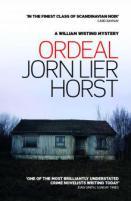 This is my second blog tour in a week which is unusual for me as I don’t normally take part in them. They’re wonderful things but I never seem to be able to read to a particular deadline. However, I definitely wanted to take part in this one as I’m a huge fan of Lier Horst’s writing. I think I’ve reviewed all this English translations on this blog and Ordeal is a worthy addition to the series.
This is my second blog tour in a week which is unusual for me as I don’t normally take part in them. They’re wonderful things but I never seem to be able to read to a particular deadline. However, I definitely wanted to take part in this one as I’m a huge fan of Lier Horst’s writing. I think I’ve reviewed all this English translations on this blog and Ordeal is a worthy addition to the series.
Taxi driver Jens Hummel disappeared six months previously and Larvik detective William Wisting has been criticised for failing to solve the case. Now, evidence suggests Hummel was killed by Danny Brodin who is already in prison for murder. Meanwhile, Wisting’s daughter, Line, helps her friend, Sophie, open a safe inside her grandfather’s house and discovers an old gun and piles of cash. Sophie, already resentful of dead grandfather, tries to cover up the discovery dragging Line into her deception.
Lier Horst’s books are always an excellent mix of police procedural and character study which give them a special place in Scandinavian crime fiction. As I’ve mentioned in other reviews, the highlight of his writing is the relationship between William Wisting and his daughter. Line is now eight months pregnant following the brief fling she had in the previous novel, The Caveman. Line deliberately gives a misleading statement yet Wisting is sensitive to her predicament in staying loyal to her friend. It’s the portrayal of a loving father aware of his daughter’s idiosyncrasies. The town of Larvik is the perfect setting for Lier Horst’s plots: mixing provincial attitudes alongside encroaching twenty-first century problems of increased drugs and violent crime.
Hugely popular in Scandinavia, Lier Horst deserves a much wider audience in the UK and, hopefully, Ordeal will bring him new English-reading fans.


March 14, 2016
Review: Quentin Bates – Thin Ice
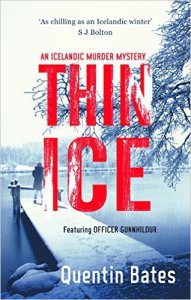 It’s my spot on the blog tour for Thin Ice, the new novel by Quentin Bates. Iceland was a country that I’d always wanted to go to, so I signed up for the Iceland Noir event in 2013 as soon as it was announced. It was not only a wonderful festival but I was bowled over by the stunning landscape and the picturesque charms of Reykjavik. I’ve now been there three times and am already planning my next visit.
It’s my spot on the blog tour for Thin Ice, the new novel by Quentin Bates. Iceland was a country that I’d always wanted to go to, so I signed up for the Iceland Noir event in 2013 as soon as it was announced. It was not only a wonderful festival but I was bowled over by the stunning landscape and the picturesque charms of Reykjavik. I’ve now been there three times and am already planning my next visit.
Iceland, of course, has some fine home-grown writers and Arnaldur, Yrsa and Ragnar all make regular appearances on this blog. Quentin Bates knows the country well, having lived there for over ten years and is fluent in the language. His knowledge of the country comes across in Thin Ice, where he doesn’t go overboard on descriptions of the landscape but tells a thrilling tale to the backdrop of an Icelandic winter. Two small-time crooks botch up an armed robbery, seize two hostages and hole up in an isolated hotel. Meanwhile in Reykjavik, Bates’s regular detective, Officer Gunnhildur (Gunna) investigates the disappearance of a mother and daughter and the death of a thief in a house fire.
As with previous books, Bates expertly takes the reader around the mishaps of those existing in the underbelly of Icelandic society. The minutiae that we discover is fascinating, including how seamen wash their underpants. The star of the book, as usual, is Gunna who combines practicality with an adventurous spirit.
Thin Ice is a meaty read with plenty of twists and turns. I particularly enjoyed how the pace quickened as we reached the denouement. I devoured the book over a cold, snowy February weekend and it was perfect winter reading.


March 11, 2016
Review: David Mark – Dead Pretty
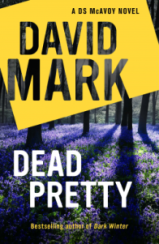 A review of the new novel from David Mark by Crimepieces guest reviewer, Rachel Hall.
A review of the new novel from David Mark by Crimepieces guest reviewer, Rachel Hall.
It seems hard to believe that Dead Pretty sees the fifth outing of DS Aector McAvoy in a series which first made an appearance in 2012. In that time, David Mark has quickly established himself as a writer with a reputation for his gritty police procedurals featuring the gentle giant DS McAvoy. Consistently strong on characterisation and with superb dialogue, Mark delivers a powerful story with the victims of some of the very darkest crimes of society right at its heart and a wry line in black humour along the way.
This is a series which I first encountered with book three, Sorrow Bound, which read well as a standalone but also left me with a need to hear more from both David Mark and his characters, in particular boss DS Trish Pharoah. Whilst it is wife Roisin with her traveller background that so many are keen to point out as what makes Aector so distinct, it is his rapport and relationship with Pharoah which really shines through and makes this series a winner.
Stubborn and relentless in his search for justice, the polite and restrained McAvoy seems the opposite of his brassy and often abrasive superior. Yet these two are both dedicated detectives, and readers learn that this is a team who have grown together over time. From his earnest years at the inception of the series, Pharoah has guided McAvoy and he, in turn, has shown her the benefit of not always storming in with all guns blazing. There is a believable chemistry between the pair and a mutual respect and affection is evident.
Dead Pretty sees the team in Hull facing numerous problems against a backdrop of scarce resources and an increasing workload. David Mark presents a picture of the despondency and disillusionment which prevail among the rank and file officers and the black humour which the characters call on to keep morale up feels natural. Aector is steadfastly searching for a missing girl and his devoted wife Roisin knows that his failure to find her is haunting him. When another girl is found brutally murdered, he looks for the connections between the two. DC Helen Bremberg, on her return from maternity leave, finds herself an unwilling secondee to the Drug Squad and back working for her nemesis, DI Shaz Archer. However, her discovery of a body in a disused property on a council estate and what looks like a victim of a vigilante attack draws her back within the domain of her former colleagues.
Whilst I found the connections between the two girls that McAvoy identifies somewhat tenuous, and whilst I retained my scepticism of the likelihood of such an occurrence, it did not spoil my enjoyment of Dead Pretty. David Mark taps into wider media debate surrounding feelings toward those who commit vigilante attacks and an individual’s right to protect themselves and their family which in turn leads some of those who work within the unit to evaluate where they stand on the issue.
Mark does a magnificent job in painting a vivid picture of Hull, a city where picturesque rural villages stand shoulder to shoulder with sink estates and he delivers an authentic picture of a busy city with a diverse population. With trendy drinking haunts side by side with the altogether more unsavoury goings on in society, Dead Pretty also makes interesting social observations. With the odd snippets of information about the people who inhabit the city, Mark speaks volumes about the people who choose to make this city their home.
Dead Pretty can be read and enjoyed as a standalone, but I doubt one encounter with McAvoy and Pharoah will be enough. There is no doubt these two work together well. If you are looking for a gritty police procedural with a strong moral compass and a splendid eye for dark humour then look no further than David Mark. Dead Pretty makes for a pleasingly complicated and satisfying novel.


March 6, 2016
Mother’s Day Giveaway – In Bitter Chill
 It’s Mother’s Day here in the UK or Mothering Sunday for those of us who worry about where to put the apostrophe in the first instance. I haven’t done many giveaways on my blog and I want to celebrate this day in some way. Those of you who have read In Bitter Chill will be aware that mothers and daughters feature strongly in the narrative and the book is dedicated to my own mother. I thought a lot about her when I was writing it.
It’s Mother’s Day here in the UK or Mothering Sunday for those of us who worry about where to put the apostrophe in the first instance. I haven’t done many giveaways on my blog and I want to celebrate this day in some way. Those of you who have read In Bitter Chill will be aware that mothers and daughters feature strongly in the narrative and the book is dedicated to my own mother. I thought a lot about her when I was writing it.
So, I’m giving away a signed copy of my US hardcover edition of In Bitter Chill and I’ll happily dedicate it to whoever you wish.
Simply fill in your name and details in the contact form below. Your e-mail address will only be used for this competition and to receive my monthly newsletter. The winner will be chosen at 12 midday (UK) time on Friday 11th March. The giveaway is open to everyone wherever you are.
Good luck!
[contact-form]


March 2, 2016
Review: Wilkie Collins – The Haunted Hotel
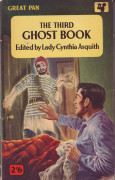 I’m stretching the definition of crime fiction by including this book but I have to admit to a major weakness for ghost stories. I’ve been devouring this winter the vintage Pan ghost story collections that I’d ordered online and they’ve been a real treat. A ghost story is perfectly suited to the shorter form. Plot strands don’t need to be tied up. In fact, as readers, we want to be left scratching our heads and of course the scarier the story is, the better.
I’m stretching the definition of crime fiction by including this book but I have to admit to a major weakness for ghost stories. I’ve been devouring this winter the vintage Pan ghost story collections that I’d ordered online and they’ve been a real treat. A ghost story is perfectly suited to the shorter form. Plot strands don’t need to be tied up. In fact, as readers, we want to be left scratching our heads and of course the scarier the story is, the better.
However, while browsing in Waterstones in Boston, Lincolnshire, I came across a reissue of Wilkie Collins’s The Haunted Hotel. It has a satisfyingly retro cover but, as I began to read it, I realised I’d forgotten what a good writer Collins is. I read both The Moonstone and The Woman in White as a teenager and it’s a shame that I left my reading of this writer with his two most famous books. The Haunted Hotel was first published in 1889 but there’s an Edwardian feel to the story. It opens with an eminent London physician receiving a visit from the Countess Narona who asks for his professional opinion as to whether she is evil or insane. She reveals that she is to be married to Lord Montbarry who has jilted his intended bride, Agnes Lockwood. A chance meeting between Agnes and the Countess has convinced the triumphant bride-to-be that Agnes will be her downfall in Venice.
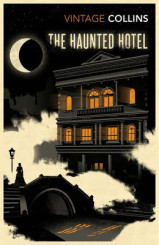 The plot then moves inexorably towards how Agnes, the Countess and various members of the Montbarry end up in a haunted hotel in Venice. The book is full of gothic elements: a missing servant, a veiled mourner and a body found in a fireplace. Somehow Collins manages to make it all believable and, as usual, the romance in the book has a realistic touch to it.
The plot then moves inexorably towards how Agnes, the Countess and various members of the Montbarry end up in a haunted hotel in Venice. The book is full of gothic elements: a missing servant, a veiled mourner and a body found in a fireplace. Somehow Collins manages to make it all believable and, as usual, the romance in the book has a realistic touch to it.
There’s another, short, ghost story at the end of the book, The Dream Woman. This was entertaining enough, but the real jewel is the story of the haunted hotel. A perfect winter read.


February 27, 2016
Review: M K Graff – Death Unscripted
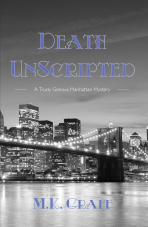 I met Marni Graff at Bouchercon in North Carolina last year. As well as being a crime author, she is also a book reviewer and an enthusiastic supporter of new writers. She kindly interviewed me for her website and took me out for a gorgeous seafood dinner.
I met Marni Graff at Bouchercon in North Carolina last year. As well as being a crime author, she is also a book reviewer and an enthusiastic supporter of new writers. She kindly interviewed me for her website and took me out for a gorgeous seafood dinner.
Marni is best known for her series featuring Nora Tierney, an American writer living in Oxford. However, her latest book, Death Unscripted, has a nurse, Trudy Genova, working a medical consultant for the TV series ‘Thornfield Place’. When the lead actor, Griff Kennedy, dies suddenly on set while pointing an accusing finger at Trudy, she is chief suspect especially as she recently rejected Griff’s advances. Trudy suspects death by poisoning and begins her own investigation, to the chagrin of the police.
The author is both a former nurse and has worked in a television environment. She brings a lighthearted touch to the descriptions of trying to insert medical realism into the TV hospital scenes. In many ways it’s a clash of two cultures: Trudy is a capable and lively professional and the world of hospital drama is filled with large egos and executives watching their backs. Griff makes an ideal victim, he’s not particularly likeable in the early scenes, and we’re rooting for Trudy from the start.
There’s a strong focus on character in Death Unscripted. Written in the first person we see Trudy’s interactions with her best friend, Meg, and Ned one of the New York detectives. In many respects, it’s a mystery in the ‘classic’ mould with parallel investigations undertaken by Trudy and the police. I’m sure anyone who loves golden age mysteries would love the feel of this book. It’s a page-turning read and written with a light-hearted charm which was hugely enjoyable.


February 20, 2016
Review: Amanda Jennings – In Her Wake
A book that everyone is talking about at the moment. In Her Wake reviewed by guest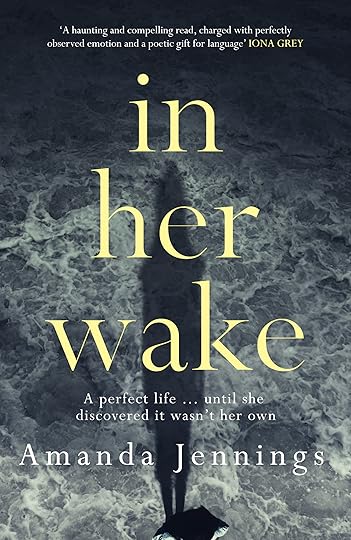 reviewer, Rachel Hall.
reviewer, Rachel Hall.
From the haunting prologue which poses numerous questions to the arrival of Bella ahead of the funeral of her mother Elaine, this is a story which effortlessly draws the reader in and never loosens its grip. As Bella returns to her childhood home and distant father in the wake of Elaine’s death her angst is palpable. With the passing of her mother, she has lost the anchor which rooted her to her life before a marriage to a domineering husband, David. Controlled by David and disconnected to her father, Henry, it is difficult not to be drawn into Bella’s plight.
Usually I find it difficult to connect with characters that allow themselves to be controlled and dictated to by other people in their lives. I feel my frustration growing and I want to shout, “can’t you see what is happening?”, but Bella has a vulnerability which is believable. As a child stifled by the love of a mother and driven into the arms of an older man in the form of university tutor, David, she has needed some form of rock to define her. It is easy to see how Bella has been bulldozed by the personalities around her and allowed decisions to be made for her, and yet the reader does not see Bella as a helpless woman, rather someone who has opted for the simplicity of an easy life in the shadow of an overprotective mother and suffocating husband.
As Elaine is buried and Henry struggles with a life bereft of meaning it is clear that Bella will not leave her childhood home untouched. The passing of her mother and unburdening of her father sets in motion a series of events. Like a car crash waiting to happen, Amanda Jennings allows her readers to experience every harrowing moment, shining an unflinching spotlight upon one woman’s journey as the Pandora’s box she dares to open plays out. Despite the shackles which have wound Bella so tightly to her old life, she has questions which need to be answered in order to gain a sense of contentment which she has longed for.
Questions adopt an urgency as Bella’s plight becomes the readers own and the secrets which are exposed wreak havoc on her emotions. Intoxicating and vivid, this will leave you battered and bruised, feeling punch-drunk but you will come out the other side and love every minute of it. In Her Wake raises questions about the memories and reflections on an old life as a woman seeks to make sense of the world she has long felt cast adrift from and with it bringing an understanding of Elaine, Henry and a childhood. Jennings cleverly contrasts the stability and routine which Bella has never questioned with all the associated upheaval that a search for the truth brings.
Quite simply, a sheer tour de force which needs to be experienced. Mesmerising and magnificent. Beautiful prose, breathtaking scenery and a powerful story of a passionate search for meaning. A phenomenal piece of brilliance by Amanda Jennings. Read, recommend and spread the word. In Her Wake has raised the bar for every psychological thriller going forward.


February 10, 2016
Review: Alex Hourston – In My House
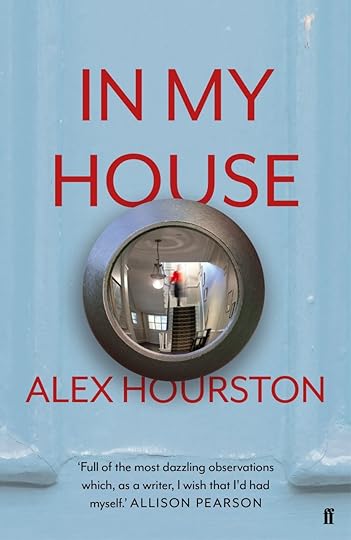 I did an event with author Alex Hourston back in the summer and she made her debut novel, In My House, sound absolutely fascinating. I had another panel with her last week in East Grinstead library and I was determined to read the book in advance of our event. I’m glad I did as it’s a beautifully written book full of descriptive prose. It’s also a mystery in the non-traditional sense where the deception at the heart of the book is slowly revealed.
I did an event with author Alex Hourston back in the summer and she made her debut novel, In My House, sound absolutely fascinating. I had another panel with her last week in East Grinstead library and I was determined to read the book in advance of our event. I’m glad I did as it’s a beautifully written book full of descriptive prose. It’s also a mystery in the non-traditional sense where the deception at the heart of the book is slowly revealed.
The protagonist of In My House, Maggie, lives a carefully controlled life near London’s Queen’s Park. At Gatwick Airport, returning from a walking holiday, a young woman pleads for her help. As a result of Maggie’s intervention, Anja is freed from the grasp of a people trafficker and asks to meet Maggie to thank her in person. Gradually Anja becomes a part of Maggie’s life but her rescuer has a secret that she’s anxious to keep hidden.
This debut novel is distinguished by its outstanding writing. I’m a big fan of long descriptive passages and I loved in the sense of place and characterisation. It’s clearly a story the author spent a long time crafting. Although the opening scene revolves around the exploitation of vulnerable women by traffickers, the book has a wider vision than this. It looks at the ability of people to start again and the extent to which we ever change.
I thought the secret at the centre of the book was heartbreaking which doesn’t make for an easy read. But Hourston makes the scenario completely believable and we’re able to identify with both Maggie and the choices she makes. In My House is a slow, intelligent and beautiful read by a talented writer. I could have read it in one sitting if I’d had the time.


February 5, 2016
Review: G J Minett – The Hidden Legacy
A glowing review from Crimepieces’ guest reviewer Rachel Hall of a debut novel .
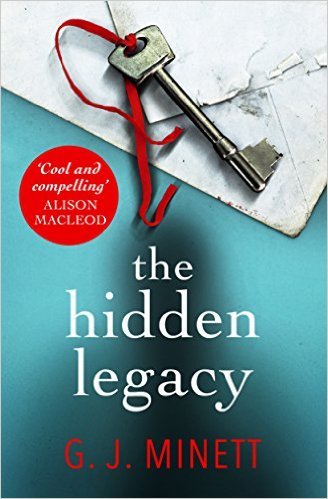 Launched in November 2015 it is hard to see what has kept this exceptionally well-written psychological thriller from gaining more critical acclaim. Subtitled ‘a dark and shocking psychological drama’, this is an intelligent, intriguing and most of all, well-constructed mystery. The accomplishment for a debut author cannot be overstated and it would seem an injustice that Graham Minett remains under the radar.
Launched in November 2015 it is hard to see what has kept this exceptionally well-written psychological thriller from gaining more critical acclaim. Subtitled ‘a dark and shocking psychological drama’, this is an intelligent, intriguing and most of all, well-constructed mystery. The accomplishment for a debut author cannot be overstated and it would seem an injustice that Graham Minett remains under the radar.
Opening with a shocking prologue from twelve year old schoolboy, John Michael Adams, as he commits a horrific attack upon two girls in a school playground in 1966, this is a story which hooks you right from the off. Readers are presented with a glimpse into the mindset of a child driven to a despicable act whom the national press soon dub “Every Parents Nightmare”.
Fast forward to 2008 and meet harassed Ellen Sutherland, newly divorced and combining a full time job with the demands of single parenting and a mother succumbing to the frailties of dementia. The arrival of a solicitors letter asking her to make urgent contact regarding the last will and testament of Eudora Jane Nash leaves her flabbergasted. The name means nothing to her and she assumes it is simply a clerical error. When the overly sincere solicitor suggests a meeting, Ellen laughs off the idea of making a six-hour round trip. That is until it is disclosed that she has been bequeathed a picturesque cottage in a Cotswolds village of significant financial worth. Remaining unconvinced she mentions the name Eudora Nash in passing to her mother and her boss, a man who is like a father to her, and can sense she has ruffled some feathers and from then on decides to delve deeper. With the accompaniment of best friend Kate making for a brilliant contrast to the staid Ellen, the pair set out to discover just what has been hidden for so many years.
From then on the reader remains with present day Ellen and interlaced between her narrative are extracts from the deceased Eudora Nash and John Michael Adams. Despite the traversing timeline, the novel intuitively flows well and readers can sense a stylistic differing between each narrator which keeps the story moving. With Ellen uncovering all of this in the present day she adds a sense of solidity to the novel. As questions arise, Minett tackles them in a timely manner yet always remains one step ahead and as each layer of intricacy is peeled back he constantly surprises his readers. It is a considerable time since I have read such an ingenious plot construction from a psychological fiction novel.
Over the intervening years the story of the John Michael Adams is disclosed and offers an insight into a minor who remains a media target for vilification, seemingly fair game for a witch hunt to uncover his whereabouts and identity upon release. The portrayal of him as a man unable to make a fresh start paints a moving portrait of a life spent running away and the shifting ground underneath him. Minett never dictates to his readers how they should interpret the wider issues which he raises through The Hidden Legacy and it is hard not to imagine how child murderers are punished by the media which never allow these things to be forgotten.
Ellen has mixed emotions about her relationship with her mother, specifically regarding her unwillingness to talk about the past, yet she is wracked with remorse as she rushes up and down the country hunting the mystery surrounding a ninety-one year old lady who she has never met whilst her ailing mother grows weaker. My overriding thought throughout the novel related to just how much a person can jeopardise in blinkered pursuit of a long held secret and the risks that this necessitates.
Whilst unputdownable is often used ad nauseam in reviews Graham Minett does not put a foot wrong in this captivating and emotionally involving story. As each layer of intricacy is uncovered he never resorts to sensationalism in his consideration of a teenage murderer or falls back on the overly twee pull on the heart-strings. This is a moving and often profound example of the psychological fiction genre and poses numerous questions leaving the reader to draw their own conclusions.
The Hidden Legacy may not be one of the heralded psychological thrillers but is deserves to be one of the most widely read and establish G.J. Minett as a striking new talent in the increasingly crowded market of psychological fiction. Outstanding.


January 31, 2016
More Scandi Crime Fiction
My reading at the moment is oscillating between Scandinavian crime fiction for the Petrona Award and ghost stories that bring back memories of my teenage years. More of the supernatural in a post next week. Meanwhile, all the Scandi books that I read were by familiar authors and it was a bit of a mixed bag.
MemoRandom by Anders de la Motte is his take on a familiar trope of crime novels, that of  memory loss. David Sarac wakes up from a car crash and can only remember that he is a police officer and he needs to protect his informant, Janus. As his colleagues desperately try to elicit the identity of Janus, Sarac’s memory returns only in fragments. Natalie Aden, his carer who has also been tasked with spying on him, helps him piece his past together as his life becomes increasingly endangered. As I’d expect from De La Motte, MemoRandom is a fast-paced thriller with an entertaining storyline. There’s always something enjoyable about a book with a race to the conclusion. The translation was by Neil Smith.
memory loss. David Sarac wakes up from a car crash and can only remember that he is a police officer and he needs to protect his informant, Janus. As his colleagues desperately try to elicit the identity of Janus, Sarac’s memory returns only in fragments. Natalie Aden, his carer who has also been tasked with spying on him, helps him piece his past together as his life becomes increasingly endangered. As I’d expect from De La Motte, MemoRandom is a fast-paced thriller with an entertaining storyline. There’s always something enjoyable about a book with a race to the conclusion. The translation was by Neil Smith.
I’m a big fan of Arnaldur Indridason but Oblivion proved to be a disappointment. There were all the elements that I enjoy in Indridason’s writing – the Icelandic landscape, the descriptions of native food and, of course, his detective Erlendur. While the writing was good, I found the plot to be lacklustre which is a shame as I persevered with it until the end. It’s a decent enough read and sits alongside the other books well enough. Fingers crossed for the next one. The translation was by Victoria Cribb.
were all the elements that I enjoy in Indridason’s writing – the Icelandic landscape, the descriptions of native food and, of course, his detective Erlendur. While the writing was good, I found the plot to be lacklustre which is a shame as I persevered with it until the end. It’s a decent enough read and sits alongside the other books well enough. Fingers crossed for the next one. The translation was by Victoria Cribb.
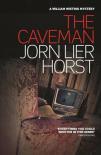 In comparison The Caveman by Jorn Lier Horst is a cracker and his best book yet. There are two storylines both of which were fascinating. William Wisting is investigating a serial killer who may have made his way from the US to Norway. The presence of CIA agents adds to the pressure on his team to find the murderer. Meanwhile, Wisting’s daughter, Line, is doing a story on a man whose body was sitting, undiscovered, in his living room for four months. Focusing on the loneliness of some Norwegians, she soon realises that there is more to the man’s death than a sad story. Lier Horst has always excelled as a writer of police procedurals but here the story telling is second to none. I didn’t want the book to finish as I was so engrossed in the narrative. More please! The translation was by Anne Bruce.
In comparison The Caveman by Jorn Lier Horst is a cracker and his best book yet. There are two storylines both of which were fascinating. William Wisting is investigating a serial killer who may have made his way from the US to Norway. The presence of CIA agents adds to the pressure on his team to find the murderer. Meanwhile, Wisting’s daughter, Line, is doing a story on a man whose body was sitting, undiscovered, in his living room for four months. Focusing on the loneliness of some Norwegians, she soon realises that there is more to the man’s death than a sad story. Lier Horst has always excelled as a writer of police procedurals but here the story telling is second to none. I didn’t want the book to finish as I was so engrossed in the narrative. More please! The translation was by Anne Bruce.





